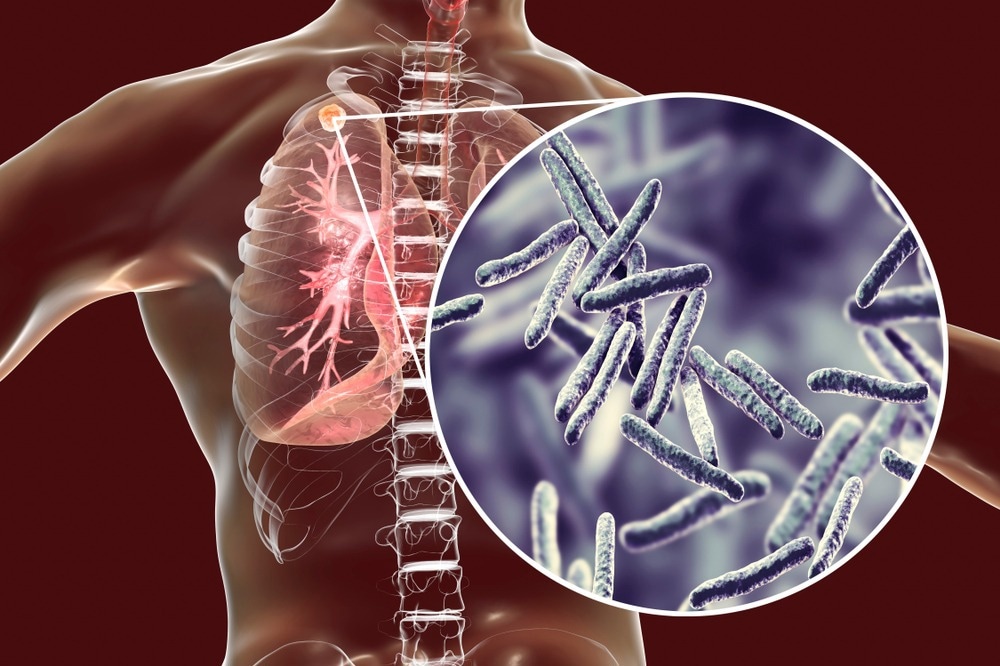Mycobacterium tuberculosis (Mtb), the bacteria that causes tuberculosis (TB), continues to be a major infectious threat to global public health. It is believed that it has infected 2–3 billion individuals and kills 1.5 million people every year.

Image Credit: Kateryna Kon/Shutterstock.com
A group of Chinese researchers has now revealed a hitherto unknown method via which Mtb neutralizes host immunity. PtpB, a known Mtb protein tyrosine phosphatase, was found as a phospholipid phosphatase that suppresses the host inflammasome-pyroptosis pathway by hijacking host ubiquitin.
The work was carried out by Prof. Cuihua Liu’s group at the Institute of Microbiology of the Chinese Academy of Sciences (IMCAS), in conjunction with Prof. Xiaobo Qiu from Beijing Normal University. The research was published in the journal Science.
Dr Liu’s team has been studying the molecular mechanisms underpinning Mtb–host interactions, and past research has identified prospective targets for the development of anti-TB medicines based on pathogen–host interaction interfaces.
Mtb is an intracellular pathogen with various intracellular survival strategies, and the complicated and dynamic interactions between Mtb and its host dictate the occurrence, progression, and outcomes of tuberculosis. Mtb has developed a collection of eukaryotic-like effectors, but their host targets and regulatory functions in pathogen-host interactions are largely unknown.
Liu’s team analyzed the whole Mtb genome in this work to forecast secreted eukaryotic-like proteins with eukaryotic-like motifs or domains that may directly target host factors. Then, utilizing an inflammasome reconstitution system to test potential inhibitors of the inflammasome-pyroptosis pathways, these Mtb effector proteins underwent additional experimental analysis.
The researchers discovered PtpB as a crucial bacterial effector that was extensively secreted by Mtb to suppress the NOD-like receptor protein 3 (NLRP3) and lacking in melanoma 2 (AIM2) inflammasome pathways out of 201 anticipated Mtb-secreted eukaryotic proteins.
PtpB reduced GSDMD-dependent cytokine production and pyroptosis to improve Mtb intracellular survival in macrophages, according to subsequent analyses. Mechanistically, Mtb-secreted PtpB targets and dephosphorylates host plasma membrane phosphatidylinositol-4-monophosphate (PI4P) and phosphatidylinositol-(4,5)-bisphosphate [PI(4,5)P2], inhibiting GSDMD-mediated immune responses.
It is interesting to note that PtpB’s specific ubiquitin-interacting motif (UIM)-like region is necessary for this phosphatase activity to bind to ubiquitin. The host GSDMD-dependent immune responses were strengthened when phospholipid phosphatase activity or the UIM-like area of PtpB was disrupted, which decreased intracellular pathogen survival.
This research shows a previously undiscovered pathogen defense mechanism that involves modifying the structure of the host membrane to prevent pyroptosis and nullify host immunity. The results are likely to lead to the development of a potential TB treatment by targeting the PtpB-Ub-phospholipid-pyroptosis axis.
Source:
Journal reference:
Chai, Q., et al. (2022) A bacterial phospholipid phosphatase inhibits host pyroptosis by hijacking ubiquitin. Science. doi.org/10.1126/science.abq0132.